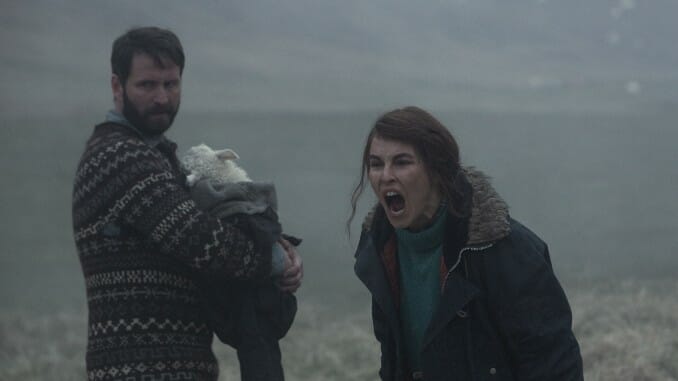Ewe Get What Ewe Deserve in Lamb‘s Muttonheaded Fable

Rhymes and fairy tales play at the edges of Lamb, the feature debut of writer/director Valdimar Jóhannsson, but it’s hard to notice anything in the periphery when there’s a little girl with the body of a human and the head of a lamb front and center. This well-realized absurdity, played as straight as modern effects allow (which is pretty damn straight), is a cute distraction in a movie that’s made cute distractions its staple crop. Amusing and impressive as its central gimmick may be, the bevy of tangents it supports—drama, eeriness and dull agriculture stitched obliquely together by Jóhannsson and co-writer Sjón—could’ve used a stricter shepherd.
Instead of Mary having this little lamb, it’s María (Noomi Rapace) and Ingvar (Hilmir Snaer Gudnason) whose quiet, rural life out in the hills of Iceland is enriched by the sheepish baby’s unexplainable arrival. The couple farm, fish and fix the tractor when it frequently craps out on them. And they raise sheep. Before Ada (the name the couple gives the baby), we’re stoically situated in their lives through stark, isolating landscape photography, close-ups on Rapace’s statuesque face and slow-burn scenes of arm’s length domesticity. Watching Rapace and Gudnason go about their farm life can get repetitive, but Jóhannsson captures his cast and their activities with an unflashy closeness that eventually accentuates moments of strangeness. These glimpses of the uncanny are almost exclusively associated with the sheep, whose endearing little faces can also go startlingly blank—allowing us to project accusatory stares and abject fear onto a pair of their alien eyes or the shuffling of their woolen masses.
Implication and projection make up most of Lamb’s chops, the rest of which are composed of Jóhannsson and his cast’s abilities with spare family drama. Rapace and Gudnason are delicate and pliable enough on their own and with each other that sequences devoted to them more clearly expressing their emotions—and thus making more pointed gestures towards their tragic backstory—feel like obvious signs of faltering faith in the audience. When Ingvar’s washed-up ex-rocker brother (Björn Hlynur Haraldsson), who has a thing for his wife, blows back into their lives, the dramatic catalyst makes the case for an isolated indie tale sans muttonheadedness.
-

-

-

-

-

-

-

-

-

-

-

-

-

-

-

-

-

-

-

-

-

-

-

-

-

-

-

-

-

-

-

-

-

-

-

-

-

-

-

-








































